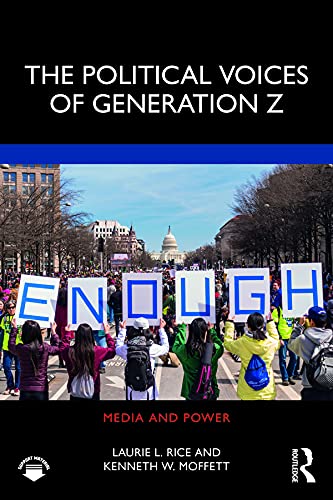The Political Voices of Generation Z by SIUE Author is a Choice Academic Title of 2023
 The latest collaborative work from a current and a former professor of Southern Illinois University Edwardsville’s College of Arts and Sciences (CAS) has earned the distinction of Choice Outstanding Academic Title for 2023. Laurie Rice, PhD, professor of political science, and Kenneth Moffett, PhD, former chair and former professor of political science, co-authored “The Political Voices of Generation Z.” The listing of the book in the year-ending coveted review in Choice magazine’s December 2023 issue represents only 10 percent of the more than 5,000 academic titles considered.
The latest collaborative work from a current and a former professor of Southern Illinois University Edwardsville’s College of Arts and Sciences (CAS) has earned the distinction of Choice Outstanding Academic Title for 2023. Laurie Rice, PhD, professor of political science, and Kenneth Moffett, PhD, former chair and former professor of political science, co-authored “The Political Voices of Generation Z.” The listing of the book in the year-ending coveted review in Choice magazine’s December 2023 issue represents only 10 percent of the more than 5,000 academic titles considered.
Rice and Moffett’s publication is recognized for a number of factors including overall excellence in presentation and scholarship and importance in building undergraduate library collections. These are high marks in the academic library community.
Rice and Moffett are longtime collaborators. They describe “The Political Voices of Generation Z” as an exploration of the “political expression of members of Generation Z old enough to vote in 2018 and 2020 on issues and movements including MeToo, Supreme Court nominations, March for Our Lives, immigration and family separation, and Black Lives Matter. Perfect for students and courses in a variety of departments at all levels, the book is also aimed at readers curious about contemporary events and emerging political actors.”
Rice explains further what it means to receive this honor.
Tell us about your and Kenneth Moffett’s expectations when you began writing the book. And how do you feel about the award?
We set out to write a book that would share original research on the ways in which members of Generation Z share their political voice on a variety of issues and movements that matter to them that would advance scholarly knowledge while communicating it in a way that is accessible to undergraduate students, many of whom are members of Generation Z.
Writing a book like this requires a significant amount of time and effort and you never fully know in advance how it will be received. It's very gratifying to have the book named a 2023 Choice Outstanding Academic Title because it is recognition that we succeeded in what we set out to do—conduct meaningful research that advances knowledge and has value for undergraduate students. Still, the email from our publisher sharing this news came as a complete surprise. I never expected to receive such a significant external validation of the value of our work. What has been the peer response to The Political Voices of Generation Z?
What has been the peer response to The Political Voices of Generation Z?
The book has received positive reviews from scholars in political science and political communication and has begun to be cited in others' work, but my favorite feedback comes through faculty at other universities who have used the book in the classroom. They found it was well received by members of Generation Z, who appreciated being portrayed in a positive light, and that it helped engage students in meaningful conversations about civic engagement. They also report the book is useful for teaching various concepts and theories in political science, because it helps make them relevant to members of this generation.
I think part of why the book is having a positive impact is because my co-author, Ken Moffett, and I approached this book as teacher scholars. For example, my orientation toward researching young adults' civic and political engagement is informed by the conversations I have with students both in and out of the classroom and when we wrote the book, we had both the scholarly community and the classroom in mind.
Have any of your students read and commented on the book?
I don't know if any of my students have read the book yet, but whenever I mention it in the classroom or share findings from it, I have found students to be highly interested and engaged.
When researching the material, what stood out most about Generation Z?
Generation Z has been more successful at finding their political voices and has done so at younger ages than the two prior generations. When members of Generation Z post online about issues that matter to them or attend protests related to causes they care about, they are more likely to get involved in other, more traditional forms of civic and political activity as well.
Do you see the country’s politics differently through the POV of Generation Z?
Others look at this generation's political views and their willingness to express them and are either threatened or encouraged by that, depending on how their views align with those most dominant among the generation. Both perspectives are forgetting that views of generations are never monolithic and that while there are some clear differences in issue positions across generations, a variety of political views can still be found among members of Generation Z. When I take a step back and look at Generation Z's overall orientation toward civic and political engagement, I see a generation that is willing to try and confront difficult challenges and wants to make a difference, and those are valuable qualities given the challenges we are facing as a nation.
What’s next?
I continue to study civic and political engagement among young adults and plan to conduct additional studies during the 2024 election season. I'm also working with Suranjan Weeraratne on a project that addresses how to help build community resilience to radicalization to violence.
“The Political Voices of Generation Z” is published by Routledge, a leading global publisher of academic books, journals and online resources in the humanities and social sciences.
PHOTO: “The Political Voices of Generation Z” book cover; Laurie Rice, PhD, professor of political science (CAS)










